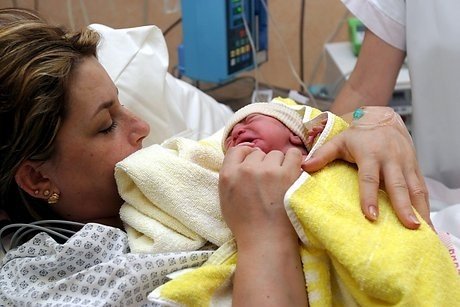Routine use of opioid painkiller 'could halve need for epidurals' | News

The RESPITE trial compared two drugs given for pain control during child labour and assessed how many of the participants later required an epidural.
“While pethidine is commonly used in labour, its effectiveness in terms of pain relief has long been challenged”
Matthew Wilson
The first and largest trial of its kind, it involved 400 women giving birth at 14 UK hospitals between May 2014 and September 2016.
The study, published this week in The Lancet, allocated half the women to receive remifentanil PCA and the other half pethidine, during labour.
Compared to the women given pethidine, it found half as many women who were given remifentanil PCA to help manage their pain needed a subsequent epidural.
The participants were told about the trial in antenatal visits or when admitted to hospital to have labour induced, and could also sign up to take part when they were in labour.
Remifentanil PCA was given as a patient-controlled drip and women could receive 40mcg of the drug every two minutes by pressing a hand-held device, whereas pethidine was given as an injection of 100mg of the drug into a muscle up to every four hours with a maximum of 400mg in 24 hours.
“The results of the trial provide strong evidence that remifentanil PCA should be routinely offered as an alternative”
Christine MacArthur
Of the 199 women who were given pethidine, 41% went on to have an epidural, compared to just 19% of the 201 women who were given remifentanil PCA.
On average, women in the remifentanil PCA group rated their pain as less severe than women in the pethidine group. Women’s satisfaction with their pain relief and its effectiveness was also significantly higher within the remifentanil PCA group compared to the pethidine group.
Women given remifentanil PCA were also less likely to need forceps and vacuum during labour than women given pethidine, said the researchers.
In the remifentanil PCA group, 93% of women received the drug, and in the pethidine group 77% of women received the drug.
The main reasons for not receiving the allocated drug were women giving birth before it could be administered or the mother deciding to immediately request an epidural after randomisation, without receiving the allocated opioid, which only occurred in the pethidine group.
Epidurals can increase the risk of needing to use forceps or vacuum during the delivery, which can in turn increase the risk of trauma and long-last problems for the mother, such as incontinence and sexual dysfunction.
In the UK and Europe, remifentanil PCA is rarely offered routinely in labour and its use is restricted to women who cannot receive an epidural for medical reasons.
In contrast, pethidine is given to more than a quarter of a million women in labour each year across the UK and many more worldwide.
Based on their findings, the study authors suggested that using remifentanil PCA instead of pethidine could reduce the need for epidurals, instrumental deliveries and consequent morbidity for large numbers of women worldwide.
However, they have also recommended more research to understand the effects of low maternal oxygen levels it can cause. This is because remifentanil was associated with twice as many mothers having low oxygen levels than pethidine, and more women in the remifentanil group were given supplementary oxygen.
One-to-one care from a midwife was provided to all women included in the trial where checks on the mother’s breathing, sedation, pain ratings and oxygen levels were carried out every 30 minutes.
The women could request an epidural at any time, and other pain relief was stopped if an epidural was given.
Whilst remifentanil PCA did not cause any negative effects for the mother or baby, more research in larger groups would be needed to confirm this. The study also reiterated that breathing problems and sedation in the mother were rare in both groups.
The study, funded by the National Institute for Health Research, was conducted by researchers from the University of Sheffield, University of Birmingham, Queen Elizabeth Hospital, and the University of Nottingham.

Dr Matthew Wilson
Matthew Wilson
Chief Investigator Dr Matthew Wilson, formerly of the University of Birmingham and now at Sheffield, said: “While pethidine is commonly used in labour, its effectiveness in terms of pain relief has long been challenged and its shortcomings are more serious when set against known side effects which include women feeling sedated and nauseous; it can also transfer to the baby via the placenta producing side effects.
Dr Wilson highlighted that it was already known that “around a third of women who receive pethidine go on to have an epidural due to inadequate pain relief”.
He reiterated that epidurals can lead to higher rates of births involving instruments, which can lead to women suffering further-long term health complications.
Dr Wilson also added there was no difference in the babies health born to women who received remifentanil PCA, which he said was “very reassuring”.
The researchers now hope to see a change in national clinical guidelines to incorporate the more routine use of remifentanil PCA.
Professor Christine MacArthur, also from Birmingham, said: “RESPITE essentially set out to examine if there was a more effective alternative to pethidine which is safe, easy to administer and could ultimately reduce the number of women who have an epidural.
The researchers were anticipating fewer women who had remifentanil PCA to then have an epidural, but did not expect to show the epidural rate could be halved, added Professor MacArthur.
“The results of the trial provide strong evidence that remifentanil PCA should be routinely offered as an alternative to pethidine and should be rolled out at hospitals across the UK,” she said.
She suggested using remifentanil PCA “could potentially reduce the financial burden on the NHS” if it cut the number of epidurals and the associated higher rates of instrumental birth.